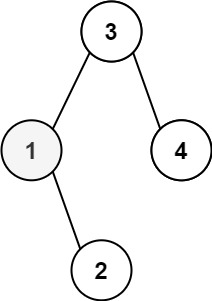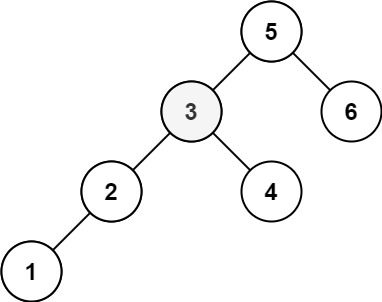Given the root of a binary search tree, and an integer k, return the kth smallest value (1-indexed) of all the values of the nodes in the tree.
Example 1:
Input: root = [3,1,4,null,2], k = 1 Output: 1
Example 2:
Input: root = [5,3,6,2,4,null,null,1], k = 3 Output: 3
Constraints:
- The number of nodes in the tree is
n. 1 <= k <= n <= 1040 <= Node.val <= 104
Follow up: If the BST is modified often (i.e., we can do insert and delete operations) and you need to find the kth smallest frequently, how would you optimize?
Companies:
Amazon, Uber, Facebook
Related Topics:
Tree, Depth-First Search, Binary Search Tree, Binary Tree
Similar Questions:
// OJ: https://leetcode.com/problems/kth-smallest-element-in-a-bst/
// Author: github.com/lzl124631x
// Time: O(N)
// Space: O(H)
class Solution {
public:
int kthSmallest(TreeNode* root, int k) {
function<int(TreeNode*)> inorder = [&](TreeNode *root) {
if (!root) return -1;
int val = inorder(root->left);
if (val != -1) return val;
if (--k == 0) return root->val;
return inorder(root->right);
};
return inorder(root);
}
};// OJ: https://leetcode.com/problems/kth-smallest-element-in-a-bst/
// Author: github.com/lzl124631x
// Time: O(N)
// Space: O(H)
class Solution {
public:
int kthSmallest(TreeNode* root, int k) {
stack<TreeNode*> s;
while (root || s.size()) {
while (root) {
s.push(root);
root = root->left;
}
root = s.top();
s.pop();
if (--k == 0) return root->val;
root = root->right;
}
return -1;
}
};
